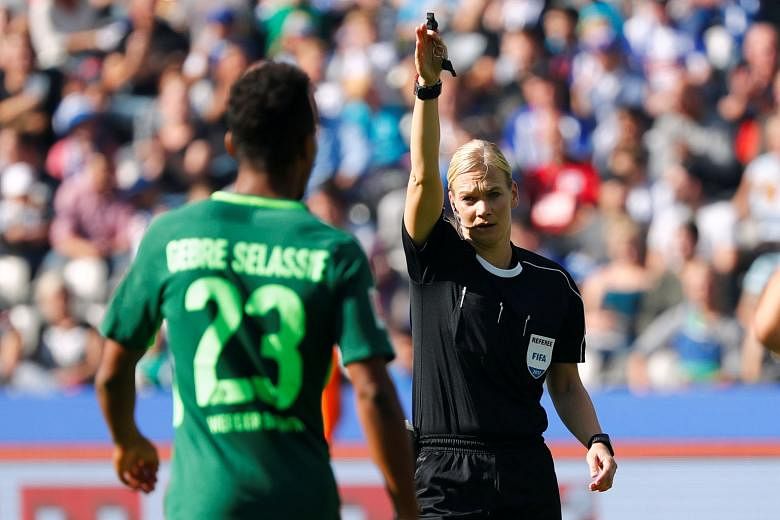When Chan Lay Hoon stepped down from her role at Valencia earlier this year, it triggered the century-old line about there being no place for a woman in a man's game.
Such an old, ignorant, chauvinist cliche.
Chan did not play for Valencia, for a start. And the turmoil around the Mestalla Stadium was the fault of an awful lot of males until things turned around under a new president, new coach, new players this season.
What is true is that Valencia had never had a woman to blame in their then 95-year existence, so it must have been men who allowed them to sink into financial mismanagement that invited the Singapore takeover by Peter Lim in the first place.
Moving on, but staying with the woman in a man's world theme, the first lady of German fussball right now is Bibiana Steinhaus, a referee whose authority on the field has finally broken the barrier of officiating in the top league, the Bundesliga.
Steinhaus, 38, a police officer in her day job, was in charge of Hoffenheim v Stuttgart on Wednesday. It was her fourth Bundesliga game this season, and passed off with just a yellow card to either side and no headlines.
That is her triumph because, prior to her debut in the men's league in a match in Berlin last September, it had seemed as if the whole world was waiting to judge her.
An alien out of the Frauen-Bundesliga (the women's league). The blonde girlfriend of former World Cup referee Howard Webb, also a policeman, who separated from his English wife and mother of his three children.
And of course, the initiation stories. One was about Franck Ribery, the Bayern Munich winger, who laddishly crept up and untied her bootlace during a game.
Another was the video that went viral after a second division game in 2010 when Hertha Berlin's midfielder Peter Niemeyer reached out to pat the referee. It went viral because his hand actually touched the Fifa badge just above the referee's left breast.
Steinhaus looked down, indicated where the hand landed, and laughed it off.

Niemeyer swore that he intended to pat the ref on the back, and if you study the video it is clear that he was looking away as he reached out his hand. Careless, but hardly the sexist groping that the media portrayed.
The fact that Steinhaus went unnoticed, or unreported, in her latest match and has had to send no player off in her season thus far suggests, perhaps, that she is winning the fight for quiet acceptance.
It takes perseverance. She began officiating in 1999, entered the second division of men's football eight years later, and became the first woman referee in the Bundesliga after another decade.
Like countless referees, Steinhaus took up the whistle because she loved the game, and wasn't the most gifted of players.
The English Premier League has so far taken only baby steps towards women in charge. Sian Louise Massey-Ellis became the first woman to carry the flag as what we used to call linesmen, now assistant referees.
After her second Premier League game, the Sky presenter Richard Keys and commentator Andy Gray were fired after they made sexist remarks that amounted to how could she possibly know anything about the offside rule.
I'm tempted to ask how any of us can interpret the mess that the gentlemen of the International Football Association Board made of rephrasing the law around so-called passive offside. Let that pass.
In any event, there are persuasive, even formidable, women in the game these days.
When Antonio Conte wants new players to improve his Chelsea squad in the January window, the person who will either sign them or tell the manager his wish list is too expensive is Marina Granovskaia.
The money, of course, comes from the club owner Roman Abramovich. But Granovskaia is his trusted negotiator who arrived in London from Moscow where she proved her judgment, and toughness, in Abramovich's Sibneft oil company.
In whatever capacity you work at Chelsea, it's likely that Granovskaia oversees the terms. Her reputation precedes her, and one leading agent recently said: "With Marina, no means no, which is actually quite rare in football."
Tough on agents who like to haggle on price and wages, but this man admitted: "When she says no, you don't hear from her again."
Granovskaia is not unique in the EPL. Karren Brady, Baroness Brady of Knightsbridge as she was appointed by the David Cameron government, was known as "The First Lady of Football" way back in the 1990s.
At that time, at age 23, Brady ran Birmingham as their managing director under the owners, soft-porn publishers, David Sullivan and David Gold. Later, when the Davids moved on to buy West Ham, Brady changed clubs with them.
As West Ham vice-chairman, she led the negotiations to sell off the old Boleyn Ground and move into the 2012 London Olympic Stadium for an annual rental that would scarcely pay for one leg of an average Premier League player.
Brady, married in 1995 to the then Birmingham player Paul Peschisolido, and Granovskaia might be among the sharpest minds in the world's most expensive league right now.
But there is another lady on the way. Amanda Staveley, born and raised in Yorkshire, is in negotiations to buy Newcastle for a reported £300 million (S$542 million).
The price is negotiable. Mike Ashley, the Sports Direct retail billionaire, wants out by Christmas, or certainly before the transfer window opens when the team need to invest in players to save their EPL status.
The word is that Staveley is seeking a clause that would drop £50 million off the purchase price should the club go down a division. This is a lady who knows the price of everything: She has homes in Dubai and Kensington, and was the dealmaker on other club takeovers and on Barclays' sponsorship of the EPL.
This time, it is written, the lady is in it for more than commission. She has seen what the men do with clubs and may think she could not do any worse in making the decisions that could bring Newcastle, a sleeping giant, to their full potential.
Woman power.


